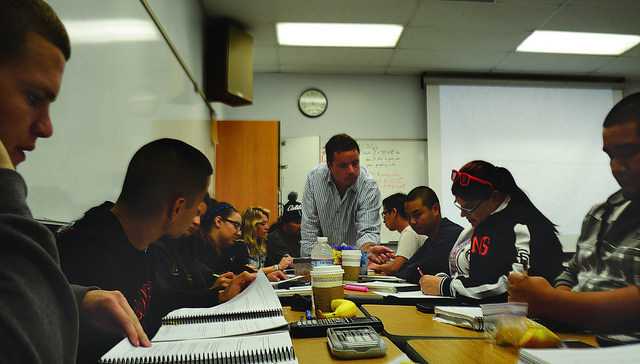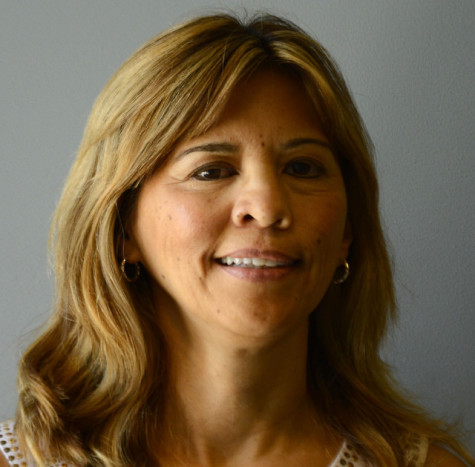Math Statway provides multiple benefits to math students
Math Professor Read Vanderbilt helps students work through problems in the new Statway class that employs collaborative problem solving.
November 3, 2014
Diablo Valley College students who think they’re bad at math should think again.
“There’s no such thing as people who are good at math (or) bad at math,” DVC math professor Read Vanderbilt says. “Everyone can become strong if they persist.”
DVC’s Statway program helps students build strong math skills. Developed by the Carnegie Foundation for the Advancement of Teaching, Statway was introduced at DVC in fall of 2013.
The two-semester sequence enables most liberal arts and social science majors to earn general education college level math credit in one year instead of the traditional three-semester path.
For many majors, it replaces Algebra 1, Algebra 2 and statistics. Statway credits are accepted by all California State University campuses.
So far, it’s working. Seventy percent of DVC students enrolled in Statway last year successfully completed the sequence, math professor Theodore Nirgiotis says. That compares favorably to the 15-20 percent success rate of students enrolled in comparable math courses on the traditional path.
More importantly, Math Department Chair Despina Prapavessi says Statway students are actually liking math.
Health major Dave Giberti, agrees.“I hate math, but this (Statway) math I like. This math, I know I’m going to use.”
How is Statway different?
“Everything is centered around real world situations,” Vanderbilt says. “It’s not as abstract as a traditional math class.”
In a typical Statway class, students are first walked through a real-life problem. Then they work in groups to try and figure it out. While the professor observes and helps when needed, his job is mostly to facilitate communication.
The benefit of all this struggle and figuring, Vanderbilt says, is that it builds the brain muscle, helping students to continually strengthen their skills.
“So you can go from feeling like you’re someone who is bad at math, to actually being quite good at it,” he says.
That happened to sociology major Shannon Riley. After failing to pass Algebra 2 several times, she enrolled in Statway.
“This is my first time … I’m actually having a B in (math) class, and doing well,” Riley says. “It’s exciting.”
On the other hand, addiction counseling major Breann VanSlooten has always liked math.
She enrolled in Statway to complete her transfer requirements more quickly, and while she likes the curriculum and collaboration, she’d prefer a more structured environment.
“I like rules and I’m used to math being about rules,” she says. “Statway is not like that.”
Still, VanSlooten says she’s grateful for Statway, and that it’s going to help her graduate and move on to a four-year university.
Since transfer requirements vary among four-year colleges and specific majors, Statway is not appropriate for everyone. It’s designed primarily for liberal arts students whose majors either don’t require math or have agreed to accept Statway for their statistics requirement.
It is not appropriate for math and science majors, undeclared majors, students planning to transfer to the University of California or majors that require math. Any student considering Statway should consult with a counselor before enrolling.
The two-semester sequence must be taken consecutively, beginning in fall and continuing through spring. DVC plans to expand the program next fall to include at least four sections.







































































